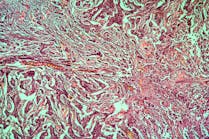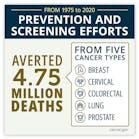Colorectal cancer is on the rise among younger adults. According to the American Cancer Society, the proportion of cases among people under 55 increased from 11% in 1995 to 20% in 2019, and it is now the leading cause of cancer-related deaths for men younger than 50.
Men are somewhat more likely to develop polyps than women, UT Southwestern experts said. They advised that people should start screening for colon cancer earlier than age 45 if they have a family history of cancer or colon polyps. If an immediate family member has had colon cancer, talk to your health care provider, particularly if the cancer developed at an early age.
Genetics plays an important role in familial and hereditary colon cancers, both UT Southwestern experts said. Some rare genetic diseases increase the chance of getting colorectal cancer relatively early in adulthood, including familial adenomatous polyposis and MUTYH-associated polyposis, a gene mutation that can cause multiple colon polyps. Lynch syndrome, also known as hereditary nonpolyposis colon cancer, increases the risk of polyps and cancer.
Testing for these genes may be recommended for families with high rates of cancer. People diagnosed with colorectal cancer should have genetic testing, which may identify the presence of some of these conditions.





